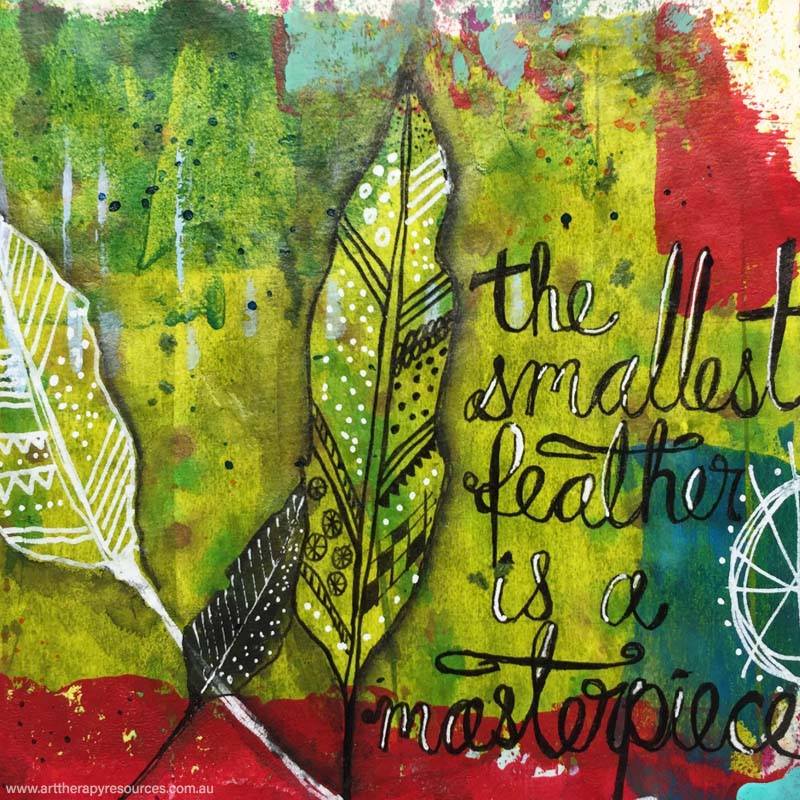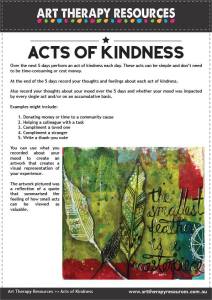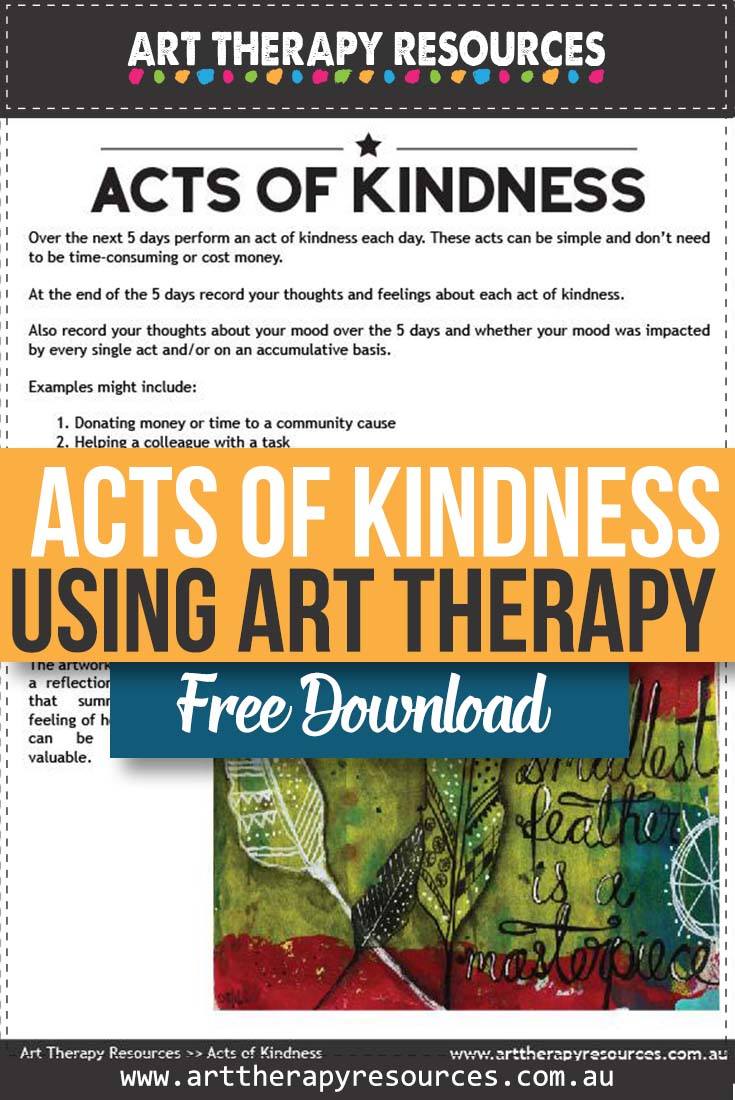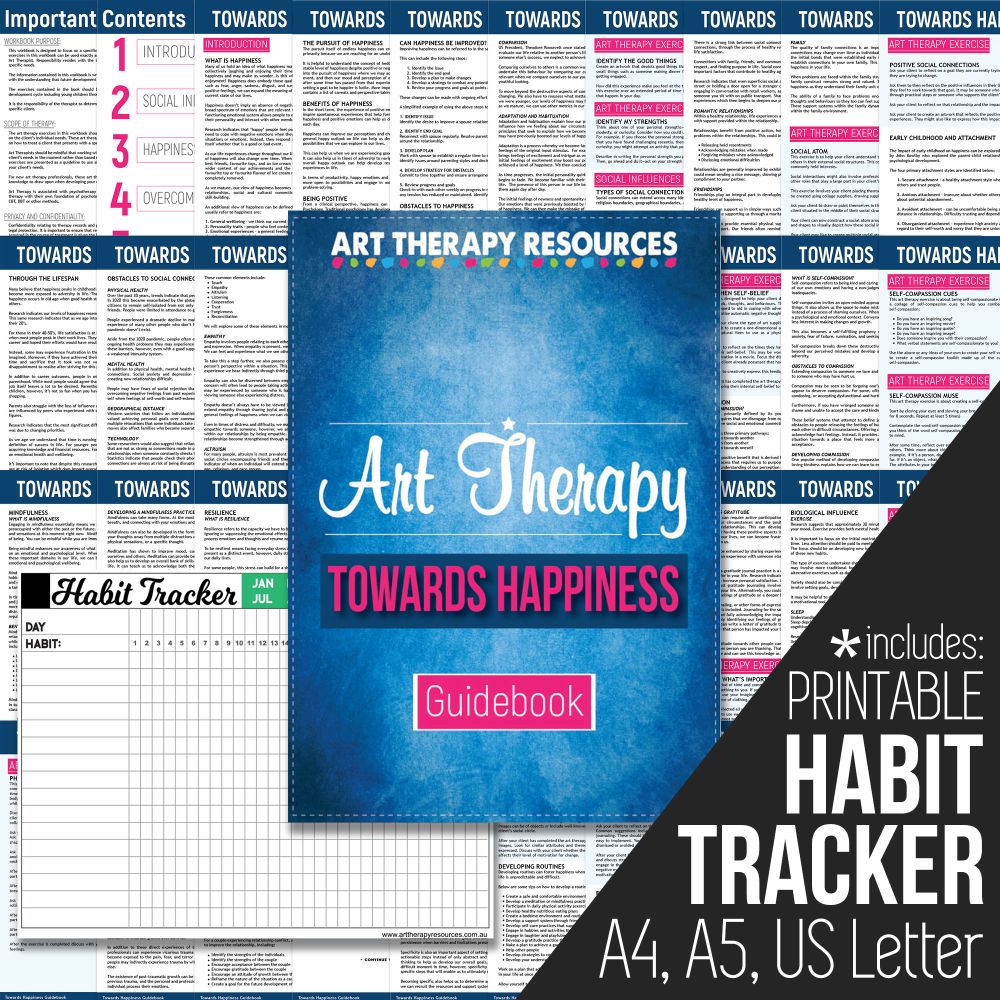THIS POST INCLUDES:
1. What are random acts of kindness (RAK)
2. The benefits of kindness
3. Art therapy exercise
5. Free Download Act of kindness exercise
WHAT ARE RANDOM ACTS OF KINDNESS
A random act of kindness, otherwise known as RAK, is a non-premeditated action that aims to spread the value of kindness. This kindness can be towards an individual person, or extend towards a group or community.
Typical RAK’s include:
- Kind words
- Cooking for someone
- Walking someone’s dog
- Mowing someone’s lawn
- Picking up litter at a community park
- Leaving someone a thank you note
- Donating money, goods, or time to charity or community organisation
These are only a small list of ideas and you are only limited by your imagination for other ideas. An act of kindness is something many of us undertake in our daily lives and can also impress into our lives through regular volunteering or donating to a charity.
In this instance, the ‘random’ aspect of acting with kindness can provide some additional benefits over what might be considered a regular act of kindness.
The ‘random’ part invokes a sense of spontaneity, surprise, and novelty. It can often mean we extend an act of kindness to someone or a group that we might not normally think about. The novelty of this act of kindness can often spark creativity within us when we embrace the randomness of doing something kind.
In art therapy, random acts of kindness can involve two approaches:
- Creating art as an act of kindness for someone or a community/group
- Doing other acts of kindness and then using art to reflect on how this act affected your wellbeing
Embracing acts of kindness can have a significant impact on our lives and art therapy provides a space in which we can explore these thoughts and emotions.
THE BENEFITS OF KINDNESS
Extending acts of kindness to others can have enormous benefits for both the recipient and the giver.
Thinking of others can divert our thoughts from our problems to understand the experience of others. They may have completely different struggles which enable us to understand our problems in context. Moreover, seeing others who have similar struggles may provide us with insight into how we manage our struggles.
Extending acts of kindness to others can help us engage in creativity and encourage us to use our mind productively. With this boost in creativity and productivity, we can also experience a boost in self-esteem along with a feeling of empowerment from connecting with our creative skills.
Other benefits of extending kindness to others includes:
- Increase in empathy and compassion
- Improvement in mood
- Physical benefits – decrease blood pressure, increase dopamine, increased physical activity
- Increased sense of connection
- Enhance existing relationships and develop new relationships
- Modeling kindness behaviours – eg pay it forward by the recipient
- Provides a focused activity for an anxious or worried mind
Granting kindness to others can help remind us that we are all connected as humans and that interacting with others with positive acts can impact both our mood and the mood of the recipient.
ART THERAPY EXERCISE
This exercise is taking from our guidebook Towards Happiness
The exercise focuses on acts of kindness and then using art to reflect on the impact that these acts of kindness have on the giver.
EXERCISE
Over the next 5 days perform an act of kindness each day. These acts can be simple and don’t need to be time-consuming or cost money.
At the end of the 5 days record your thought and feelings about each act of kindness.
Also record your thoughts about your mood over the 5 days and whether your mood was impacted by every single act and/or on an accumulative basis.
Examples might include:
- Donating money or time to a community cause
- Helping a colleague with a task
- Compliment a loved one
- Compliment a stranger
- Write a thank-you note
You can use what you recorded about your mood to create an artwork that creates a visual representation of your experience.
The artwork pictured was a reflection of a quote that summarised the feeling of how small acts can be viewed as valuable.

TOWARDS HAPPINESS GUIDEBOOK:
This guidebook explores the foundation of happiness and how to construct a more meaningful life.
In this guidebook you will learn practical strategies for developing happiness in your life. Therapists can assist clients through exercises that provide practical guidance to engage in happiness habits.
A focus in this guidebook is directed towards social and emotional concepts that facilitate happiness. Important psychological and biological factors are explored to understand the impact that relationships and lifestyle factors have on improving happiness.
In this workbook you will find a path to developing happiness that focuses on social connection, compassion, gratitude, acceptance, and perception.
You will find a list of 20 art therapy exercises that will develop understanding around cultivating and sustaining a personalised level of happiness.
Also included in this guidebook is a free printable Habit Tracker to assist in identifying and monitoring useful habits that will improve your wellbeing.
This guidebook is direct and easy to understand. The materials presented in the guidebook are written based on current scientific literature available.
Included in the guidebook is a comprehensive reference list of publications that were used to form the content of this workbook.
The contents of this guidebook include:
IMPORTANT
- Workbook purpose
- Scope of therapy
- Privacy and confidentiality
- Legal
INTRODUCTION TO HAPPINESS
- What is happiness?
- The pursuit of happiness
- Benefits of happiness
- Being positive
- Can happiness be improved?
- Obstacles to happiness
- Comparison
- Adaptation and habituation
- Art therapy exercise 1
- Art therapy exercise 2
SOCIAL INFLUENCES ON HAPPINESS
- Types of social connections
- Romantic relationships
- Friendships
- Family
- Art therapy exercise 3
- Art therapy exercise 4
- Early childhood and attachment
- Through the lifespan
- Obstacles to social connections
- Physical health
- Mental health
- Geographical distance
- Technology
- Elements of social connections
- Empathy
- Altruism
- Art therapy exercise 5
- Forgiveness
HAPPINESS HABITS
- Developing a big picture
- Interrupting negative thoughts
- Art therapy exercise 6
- Art therapy exercise 7
- Compassion
- What is compassion?
- What is self-compassion?
- Obstacles to compassion
- Developing compassion
- Art therapy exercise 8
- Art therapy exercise 9
- Mindfulness
- What is mindfulness
- Benefits of mindfulness
- Developing a mindfulness practice
- Art therapy exercise 10
- Art therapy exercise 11
- Resilience
- What is resilience
- Benefits of resilience
- Developing resilience
- Art therapy exercise 12
- Art therapy exercise 13
- Acceptance
- What is acceptance
- Benefits of acceptance
- Obstacles to acceptance
- Developing acceptance
- Gratitude
- What is gratitude
- Benefits of gratitude
- Developing gratitude
- Art therapy exercise 14
- Biological influence
- Exercise
- Sleep
- Art therapy exercise 15
- Art therapy exercise 16
OVERCOMING DIFFICULTIES
- Trauma
- Interpersonal conflict
- Art therapy exercise 17
DEVELOPING HAPPINESS HABITS
- Setting goals
- Art therapy exercise 18
- Developing routines
- Art therapy exercise 19
- Facing setbacks
- Art therapy exercise 20
- Practicing happiness
ART THERAPY EXERCISE
- 20 Art Therapy Exercises (file provided that contains all art therapy exercises in one download)
GUIDEBOOK REFERENCES
FREE DOWNLOAD: Art Therapy Exercise
SIGN UP below to download the FREE Art Therapy Exercise taken from our Towards Happiness Guidebook

BUILD YOUR ART THERAPY REFERENCE MATERIALS:
Pin this image to your Pinterest board.

SHARE KNOWLEDGE & PASS IT ON:
If you’ve enjoyed this post, please share it on Facebook, Twitter, Pinterest. Thank you!

